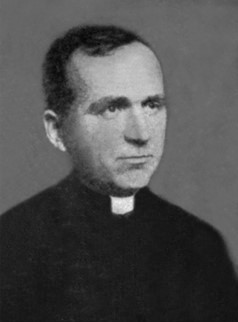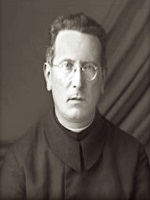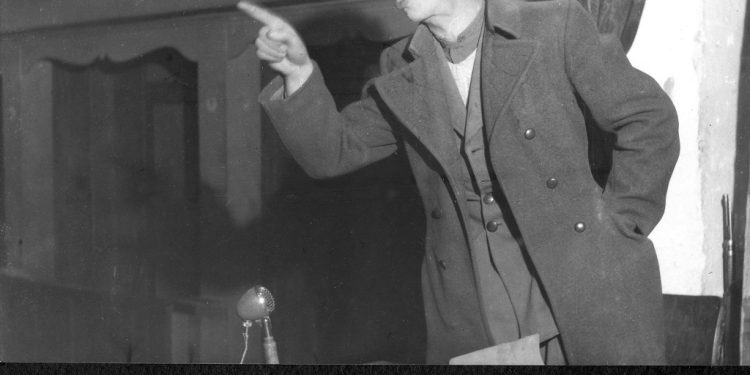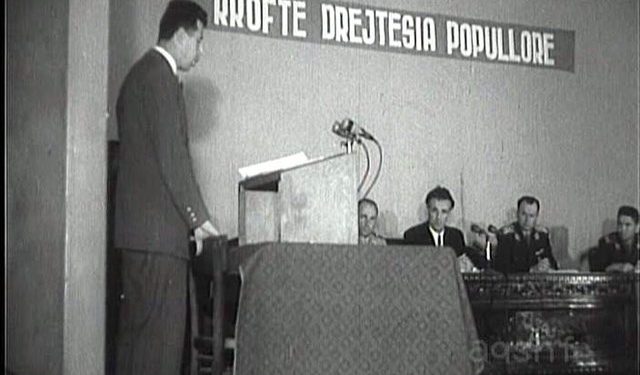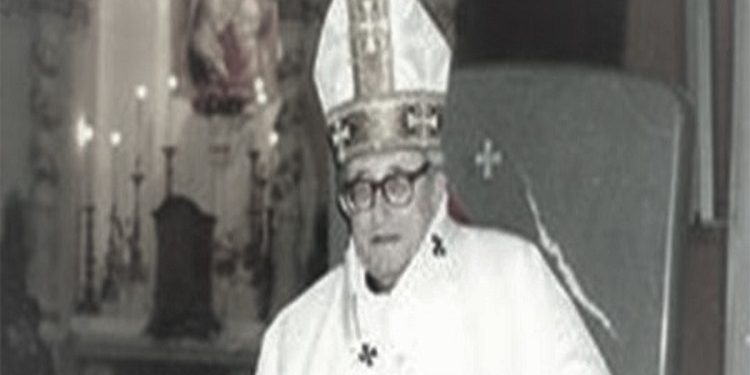By Father Xovan Kemal Kokona
Memorie.al / The Way of the Cross for the Jesuits Father Danjel Dajani and Father Xhovani Fausti, would begin on the evening of the “Immaculate Virgin Mary”, with the arrest of seminarian Mark Çuni, followed by the arrests of five other seminarians. On December 31, 1945, shortly after they had finished the “Te Deum” hymn, the two Jesuit fathers were arrested by some officers of the so-called: People’s Protection Division. Even though they were going to be tortured and, in a farcical trial, the decision for them was made in time. From the day of their arrest, until their execution, a wild campaign will be launched against them, with conferences and rallies, where organized groups will shout, “Bullet in the forehead to the traitors”!
Who was Father Danjel Dayani?
Father Danjeli was born in the village of Blinisht, Lezha district, on December 2, 1906, to parents Llesh Zefi and Mara Pashuk Balldreni, from Gjadri. He had only one brother, older than himself. At baptism, he was given the name Dimitar, but starting from the novitiate period onwards, he will only use the name Daniel.
His deeply Christian family accepted the seeds of Daniel’s calling as a blessing from God. And this one, when he reached the age of 20, in 1926, chose to enter the Society of Jesus, in order to become a Jesuit, and by accepting the novitiate, in Gorizia, he will begin this journey, which he will continue until when he will complete it, with the grace of martyrdom.
After receiving his license in Philosophy, he will return to Shkodër, where he will teach the Latin language course for two years. He will return to Italy, where he will continue his theology studies in Kieri. There, he will be ordained a priest on July 15, 1938.
Eventually he returned to Albania, in 1941 and, in the fall of that year, until 1945, he would be part of the itinerant mission of the Jesuit fathers, thus engaging in the evangelization of the people and the reconciliation of the blood in the mountainous areas and rural. He was 36 years old, when in 1942, on the feast of the Presentation of Jesus in the Temple; he will make eternal vows, among the Jesuit fathers.
When, in September 1945, he was entrusted with the responsibility of the Albanian Pontifical Seminary and that of the Director of the Saverian College, the political waters in Albania were already very turbulent. Father Danjeli, had an average height; not big; with a regular face. He was a calm and serious person, with a penetrating gaze and eyes, measured in gestures and words; not bad.
He was an impeccable and diligent orderly and priest, chaste, generous, comforting and morally exemplary, concerned for the good of souls, especially the formation of seminarians, with whom he was very fond, or, as Monsignor Frano emphasizes Illia: “Like a gentle brother”.
The Jesuit, Father John Karma, includes Father Daniel, middle; “true sons of the Society (of Jesus)”. Father Giovanni Fausti wrote about him: “I was impressed by his content and sincerity.” While Dom Luigj Kçira remembered him like this: “He was a man of God and … very pious”.
His former student, Dom Simon Jubani, remembered that: “When he celebrated Mass, he was careful, humble and pious.” In addition to the devotion to the Mass, the Holy Eucharist, Father Danjeli had a special devotion to the Blessed Virgin Mary and St. Luigi Gonzaga”.
Father Danjel Dajani S.I. took charge of the Jesuit Community and the Saverian College, which had more than 400 students, when the situation in Albania had turned into the chaos of a merciless persecution, against everything that had the flavor of the Catholic Church.
In February 1945, the Jesuit fathers, in less than three months, had experienced eighteen controls, including the opening of the Church’s tombs, and all their useful items had been seized. In the first quarter of the same year, Catholic schools were ordered to create sections of the Youth Front (Anti-Fascist Youth Union of Albania) and special agitators went every week to hold political conferences.
It is, therefore, this kind of atmosphere that also preceded the political elections of December 2, 1945, which, as the Jesuit Father Luigi Rosa notes in his diary; “just for freedom, it was out of the question”.
Although the law in force “guaranteed” that it would not be permissible to arrest someone for political reasons, 15 days before and after the elections, in reality, three days before the elections, some 15- and 18-year-old youths are arrested for distributed electoral tracts, young people who, as it turned out, were subjected to all kinds of torture.
The “Way of the Cross” for the Jesuits, and especially for Fathers Danjel Dajani and Father Xhovani Fausti, would begin on the evening of the vigil of the feast of the “Immaculate Lady” with the arrest of seminarian Mark Çuni, followed on December 9 and 12, with the arrests of five other seminarians.
All of them are accused of forming an organization called “Albanian Union”, which even if it were true, would not contradict the laws in force.
But the purpose is elsewhere. Fathers are secretly informed by a student, Fejzi Lici, that; “Jacobs are constantly subjected to torture. They want them to say that they were encouraged by one of the superiors Father Xovani Fausti and Father Dajani”.
And their hour is not long. On the evening of December 31, 1945, shortly after they had finished singing the Te Deum hymn, the two fathers were arrested by some officers of the so-called People’s Defense Army. Although they will go through torture and a farce trial, the decision for them has been made in time.
From the day of the arrest until the execution, a wild campaign will be launched against them with conferences and rallies, where organized groups will shout, “Bullet in the forehead for traitors…”!
Father Dajani continued to remain calm and sober, even though, like Christ, no torture was spared in the investigation directed by the ruthless Fadil Kapisizi. “He behaved like a lamb in front of wolves”, – testifies Gjovalin Xanxhafili, while Dom Luigj Kçira said: “They didn’t even give him water to drink”!
After this whole two-month “process”, the day of “judgment” came on February 22, 1946. The Military Court composed of the president Mustafa Iliazi, (with three years of high school), two former workers, Namik Qemali and Tonin Miloti, and the 22-year-old prosecutor, Aranit Çela, (with the Commercial School of Vlora); reach the end of the death penalty, of these innocents.
Even though the president of the court himself testifies in his report that; “the seminarians have denied that Father Fausti and Father Dajani were the heads of the organization”, this does not prevent him, nor Enver Hoxha himself, from advancing their decision, for the destruction of any form of justice. Prophetic are the words of the lawyer Kol Dhimitri, in the trial: “If you condemn these priests, you will add two martyrs to the Catholic Church and hatred towards yourself”.
Lawyer Dhimitri and the other defender, Paulin Pali, would pay with their lives for the protection they provide to these martyred heroes. Father Dayan’s calmness and clarity continued stable. As Dom Tom Laca testified: “The convicts’ lips did not tremble, and their hearts did not tighten.”
After they had confessed, they arrived at the place of execution and, kneeling in the mud, reverently received Holy Communion. It was the dawn of March 4, 1946 and Father Dajani was a little over 40 years old.
Before the barrage of machine guns was unleashed on him, he spoke, just like the Crucified One, with these words: “I forgive all those who have wronged me. I am glad that I am dying innocent”, and then he left the last message: “My parents (mother, since his father had died), or relatives, give money to Dom Zef Shllak, for celebrated two Masses”.
And there, under the shadow of two great Chinese trees, at the cemetery of Rrmaj, he fell, as Monsignor Frano Illia has determined, a suffering martyr of religion, deserving, as Father Gjergj Vata has not hesitated to affirm, the crown of holiness and glory. Memorie.al




